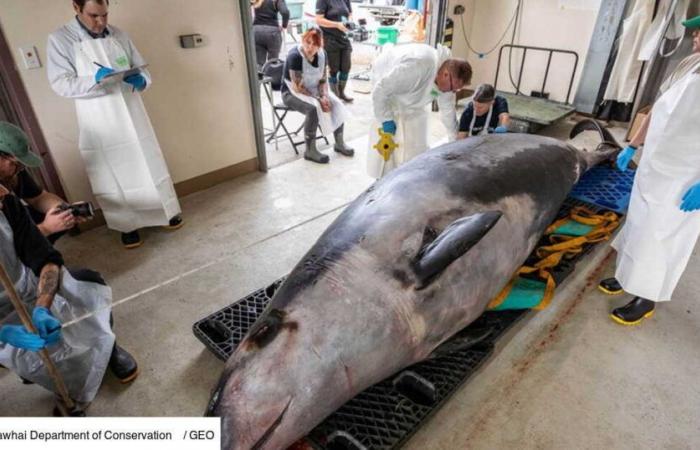No one has ever seen her alive. For good reason, this species of whale is the rarest in the world. The Travers beaked whale or Mesoplodon traversiiis a cetacean of the family of Ziphiidae (beaked whales). Observed for the first time in the 19th century, it has since been seen only 6 times, and always stranded.
In July 2024, this Travers’ beaked whale was found on a beach in Otago, New Zealand. An exceptional discovery for scientists, who had the opportunity to study it for the first time in such a good state of conservation, reports Interesting Engineering.
No less than 9 stomachs
Dissections followed by analyzes were therefore carried out by the indigenous organization Te Rūnanga o Ōtākou, in collaboration with the Department of Conservation, the Otago Museum and the University of Otago. And their results are astonishing to say the least.
The 10 most fascinating whales
According to the release, scientists have discovered that Travers’ beaked whale has 9 stomachs. They were thus able to study this particular anatomy, as well as the functioning of its diet.
“In some of these stomachs we found squid beaks and lentils from squid eyes, some parasitic worms, and perhaps other parts of organisms that we’re not entirely sure of.”said Anton van Helden, marine science advisor, in a statement.
These parasites will soon be studied by a parasitologist who will define their nature.
Vestigial teeth
Another major discovery: the upper jaw of Travers’ beaked whale is equipped with tiny vestigial teeth. Vestigial structures are remnants of organs or structures that were once functional in a species’ ancestors, but have lost their original function.
Evolutionarily, this helps understand how these whales evolved from ancestors with fully functional teeth. Over time, as the whale’s diet and lifestyle changed, these teeth became less necessary, but they did not completely disappear from the genetic code.
These studies carried out between Western and indigenous experts have also proven to be particularly relevant. For Anton van Helden, this collaboration allowed them to learn more about “the importance of the whale to the Māori people, traditional stories, and the sacredness of the whale”. In honor of the Māori community, the whale was named Ōnumia, after the region where it was found.






